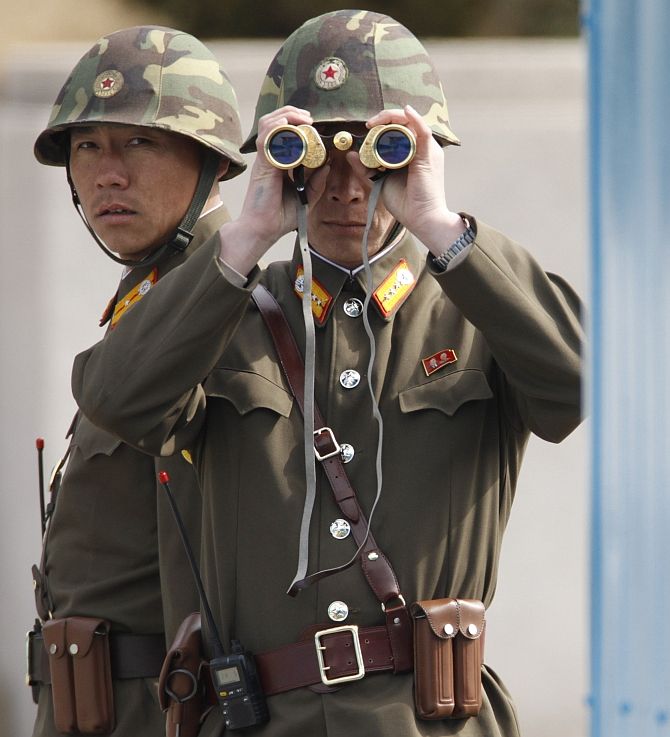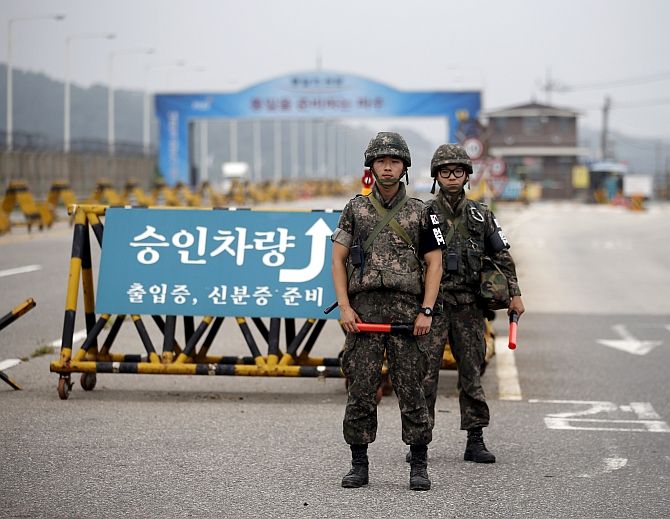North Korea has threatened to go to war with South Korea a day after the latter fired dozens of artillery rounds across the rivals' border in response to what it said were rounds of Pyongyang's artillery launched at the South.

According to media reports, North Korean leader Kim Jong Un on Friday declared his frontline troops in a "quasi-state of war" and ordered them to prepare for battle.
A KCNA report on Friday accused South Korea of committing a "military provocation."
Kim presided over an emergency meeting of the North's Central Military Commission late Thursday, issuing an order that the army's "front-line large combined units" should "enter a wartime state to be fully battle ready to launch surprise operations," KCNA said.
Tensions erupted on the Korean Peninsula after two South Korean soldiers were seriously wounded by landmines on August 4 in the demilitarized zone that separates the two countries. Accusing the North of deliberately planting the mines -- an allegation that Pyongyang denied -- Seoul vowed a "harsh" response to the landmines and resumed blaring propaganda messages over the border from huge loudspeakers last week.
In response, North Korea on Thursday shelled across the border reportedly to protest against the propaganda broadcasts which restarted after a hiatus of 11 years.

The two sides traded artillery fire over their heavily fortified border on Thursday afternoon, according to the South Korean Defense Ministry.
Two shells came from the North Korean side, the ministry said, and South Korea fired dozens of shells in response.
The Korean People's Army followed up with an ultimatum sent via military hotline that gave the South 48 hours to dismantle loudspeakers blasting propaganda messages across the border or face further military action. The South's defence ministry dismissed the threat and said the broadcasts would continue.
South Korea's unification ministry has announced that it was restricting access to the North-South's joint industrial zone at Kaesong. Only South Koreans with direct business interests in Kaesong -- which lies 10km over the border inside North Korea -- would be allowed to travel there, a ministry spokesman said.
The North often uses fierce rhetoric when tensions rise and it has made similar declarations before.
The BBC's South Korea correspondent Steve Evans says that although this ritual of aggression often sees such language escalate to the firing of ammunition, this time the rhetoric is fiercer and and artillery shells are now in use.

Perpetually in a state of war
The Demilitarised Zone is a legacy of the 1950-53 Korean War, which ended with an armistice, not a peace treaty, leaving the Korean Peninsula still technically in a state of war.
Besides border skirmishes, other incidents have proved provocative.
Over the past six decades, skirmishes have flared repeatedly along land and sea borders as each state aims to reunify the peninsula according to its own terms and system of government. Deadly naval clashes occurred along the demarcation line in 1999, 2002 and 2009.
In 1968, North Korea dispatched commandos in an unsuccessful attempt to assassinate South Korea's President. In 1983, a bombing linked to Pyongyang killed 17 high-level South Korean officials on a visit to Myanmar. In 1987, the North was accused of bombing a South Korean airliner.
Photographs: Reuters










 © 2025
© 2025